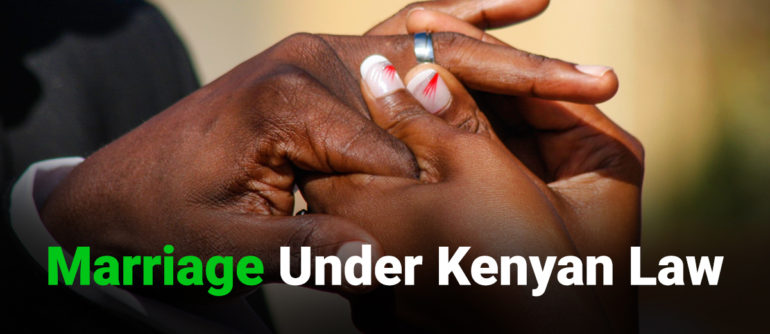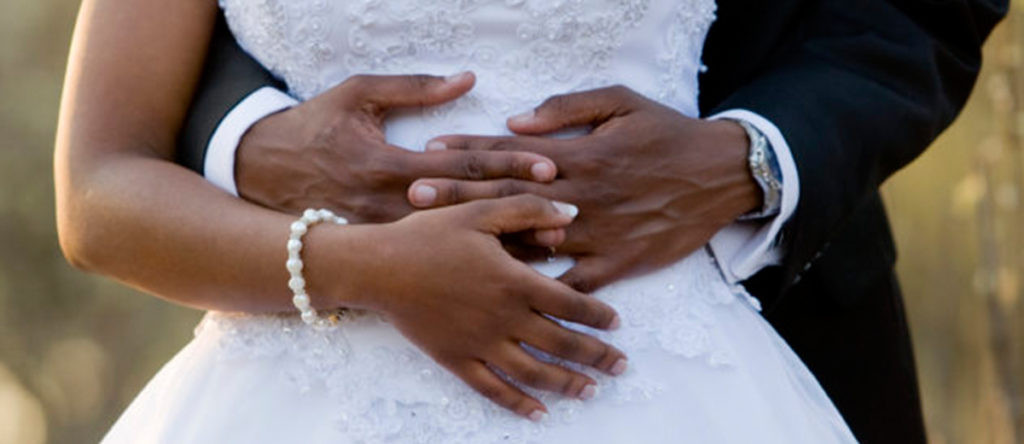
For a marriage to be legally recognized in Kenya, it must comply with certain legal requirements laid out in the Marriage Act, 2014. Even if the marriage is recognized by the community or religion, it may not be a lawful marriage according to Kenyan law.

Whether a marriage is legally recognized or not is very important because this can have significant consequences particularly in relation to benefits, finances, & property rights.
Legal Benefits and Obligations of a Married Person
There are certain rights that are acquired by virtue of a person being married under Kenyan law. These include but are not limited to:
- Employment: The right to access the benefits of employment of an employee such as medical cover, life policies, school fees, pension pay-outs etc;
- Marriage: The right and/or capacity as a person to legally marry one or more spouses;
- Medical Emergencies: The right to approve or authorise an intervening medical procedure;
- Physical or mental incapacity of a person: The right of a spouse to be a legal representative of an incapacitated person;
- Birth of Children and Citizenship Rights: The acquisition of rights to citizenship of a country of their parents;
- Debts Owed by and /or Monies owed to your Spouse: The rights with regard to collection of debts owed to your spouse, or the liability to pay debts owed by your spouse to creditors you guaranteed, or that were guaranteed by jointly owned marital property;
- Divorce: The right to division of property acquired during the marriage, visitation rights with regard to children from that marriage, and the provision of spousal or child support;
- Death: The burial rights of a deceased person, inheritance of the deceased’s properties or any benefits accruing to them especially where the person dies without a Will.
- Property: The right to freely access and use the property of a spouse during the course of the marriage.
The Legal Threshold for A Marriage Under Kenyan Law
So how does one establish whether or not they legally qualify to be identified as a married person under Kenyan law?

The Constitution of Kenya (2010), Article 45(2) provides that:
“Every adult has the right to marry a person of the opposite sex, based on the free consent of the parties”
The Constitution further authorizes Parliament to enact legislation that:
- Recognizes marriages concluded under any tradition, or system of religious, personal or family law; and
- Any system of personal and family law under any tradition, or adhered to by persons professing a particular religion PROVIDED THAT such marriages or systems of law are consistent with the Constitution.
The legislation enacted ensures that the matters such as age, sex, degree of consanguinity, mental and physical capacity of the persons involved are considered before the person is deemed legally capable of marriage
Marriage Under Kenyan Law; Marriage Act (No.4 of 2014).
Marriage in Kenya is governed by the Marriage Act, 2014 which provides for the different kinds of marriages recognised under Kenyan law as explained below:
Christian Marriages
This is a marriage where a party to the marriage professes the Christian religion. This is a one-woman, one-man kind of union. The ceremony is usually officiated by a licensed church minister.

Once a man or a woman marries under a Christian Marriage, they cannot marry another spouse until either death or divorce of one of the parties.
Once the ceremony has been held and no objection recorded, a marriage certificate will be issued by the person officiating the marriage. The certificate shall be signed by the parties to the marriage, in the presence of two witnesses.
Civil Marriage
A marriage under this Part shall be celebrated by the Registrar in a place determined by the Registrar. Usually occurs at the Attorney General’s Offices. This is also typically a one-man, one-woman union, with similar parameters to the aforementioned Christian Marriage.
Where a man and a woman intend to marry, they are required to give the Registrar and the person in charge of the place where they intend to celebrate the marriage a written notice of not less than twenty-one days, and not more than three months of their intention to marry.
When a marriage has been celebrated in the presence of a Registrar, the Registrar shall complete and sign a marriage certificate in the prescribed form, and cause the marriage certificate to be signed by the parties and witnesses.
African Customary Law
A marriage under this law is celebrated in accordance with the customs of the communities of one or both of the parties to the intended marriage. Where the payment of dowry is required to prove a marriage under customary law, the payment of a token amount of dowry shall be sufficient to prove a customary marriage.
The parties to a customary marriage shall notify the Registrar of such marriage within three months of completion of the relevant ceremonies or steps required to confer the status of marriage to the parties in the community concerned.
Previously, the notification to the Registrar was not a requirement, however, with an increase in contentious cases around the issues of marriage, death and inheritance, the requirement for the notification was introduced in law.
-
- The notification to the Registrar should contain the following confirmations:
- The customary law that applied to the marriage;
- That the relevant customary rights to solemnize the marriage have been carried out;
- The parties to the marriage were eighteen years of age at the time of the marriage;
- The marriage is between persons who are not within a prohibited marriage relationship; and
- The parties freely consent to the marriage.
For an already existing Customary marriage, as previously indicated, the Law had no requirement for registration by the Registrar, however now under the Marriage (Customary Marriage) Rules, 2017 there is the notification requirement.
Any customary marriages conducted before 1st August 2017 are deemed “Existing” customary marriages while those conducted after 1st August 2017 are considered “New”.
In order to be furnished with a Marriage Certificate for an Existing Customary Marriage, the process is as follows:
-
- Fill an Application Form;
- After submission of the Application Form, both parties are to book an appointment on the E-Citizen online platform and appear before the Registrar of Marriages in person for submission of the original documents and interview within 7 days.
Polygamy under African Customary Law
In African Customary marriages, a man is allowed to marry more than one wife. There is no upper limit to the number of wives the man can marry.
The only requirement for this kind of union is for the parties to perform the customary marriage rights of the persons involved in the union as indicated above.
Woman to Woman Marriage under African Customary Law
There are instances under customary law that permit a woman to woman marriage. These unions are far removed from homosexual relationships we know from western culture, which are not recognised in Kenya. These marriage unions are typically sexless.
These unions normally arise where a woman in question cannot sire her own children and therefore marries a fellow woman who acts as her surrogate.
In most instances, the woman is usually past childbearing age and her husband has died leaving the union childless. The woman, therefore, seeks external help to continue her husband’s name and lineage.
In Civil Appeal Case No.15 of 2018 – Wilfred Mongare Orina V Askah Mocheche Momanyi, a book titled The Law of Marriage and Divorce” Vol. I Sweet & Maxwell, 1968 is referenced and simply describes woman to woman customary unions under the Kikuyu Customary in the following terms:
“Where a husband dies leaving a childless widow, who is past child-bearing age, the widow may marry a wife. The widow pays ruracio (marriage consideration) to the family of the woman selected and arranges for a man from her deceased’s husband age set to have intercourse with her. Children resulting from such intercourse are regarded as children of the widow’s deceased husband.”
Hindu Marriage
This marriage union shall apply only to persons who profess the Hindu faith.
A Hindu marriage is usually officiated by a person authorised by the Registrar in accordance with the Hindu religious rituals of a party to the marriage.
Hindu marriages are typically between one man and one woman. A unique characteristic of Hindu marriages is that the bride is required to pay dowry to the groom’s family. This is quite the opposite in African Customary marriages where the groom pays the dowry/bride price.
Islamic Marriages
This type of marriage union shall only apply to persons who profess the Islamic faith.
An Islamic marriage shall be officiated by a kadhi, sheikh or imam as may be authorised by the Registrar and celebrated in accordance with Islamic law.
The person authorised to officiate at an Islamic marriage shall record the details of the marriage and shall deliver the record to the Registrar for the registration of such a marriage.
A unique characteristic of Islamic marriages is that one man may have up to four legal wives but he is required to treat all wives equally. If the man fears that he will not be able to meet these conditions then he is not allowed more than one wife. Women are however allowed only one husband at a time.
Common-Law Marriage
These are marriages that are formed on the basis of assumption of Law.
In Civil Case No. 1372 Of 2001 – Christopher Gathambo V Samuel Munene, the following was relied upon:
Bromley Family Law, 5th Edition states that a marriage is presumed to have occurred if:
“… a man and woman cohabit and hold themselves out as husband and wife, this in itself raises a presumption that they are legally married and when it is challenged, the burden lies on those challenging it to prove that there was in fact no marriage, and not upon those who rely on it to prove that it was solemnized.”
Further, Halsbury’s Laws of England 3rd Edition states that:
“Where a man and woman have cohabited for such a length of time and in such circumstances as to have acquired the reputation of being man and wife, a lawful marriage between them will generally be presumed, though there may be no positive evidence of any marriage[ceremony] having taken place and the presumption can only be rebutted only by strong and weighty evidence to the contrary”.
In the case of Civil Appeal No. 313 of 2001 [2009] – Phylis Njoki Karanja & 2 others v Rosemary Mueni Karanja & Another the following was stated:
“Before a presumption of marriage can arise a party needs to establish long cohabitation and acts of general repute; that long cohabitation is not mere friendship or that the woman is not a mere concubine but that the long cohabitation has crystallized into a marriage and it is safe to presume the existence of a marriage.”
Therefore, unless one can strongly prove against a presumption of marriage, the courts will generally assume a marriage occurred so long the parties thereto had the capacity to marry and cohabited for a reasonably long period of time.
Marriage and Workplace Policies
As an Employer, it is important to ensure that the relevant Human Resource policies are in place:
- Ensure that your employee provides documentation relating to their marital status at the commencement of any work assignment or engagement. Where they previously provided Affidavits of Marriage, request them for a Marriage Certificate as provided under the Marriage (Customary Marriage) Rules, 2017.
- Ensure that that in the event that there is a change in circumstances of an employee’s marital status (legal separation, divorce, new spouse, death or incapacity), an update of the same is provided in the HR File;
- Ensure that your employees periodically (at least on an annual basis) update their HR Files with the details of their Next of Kin. These are very necessary when handling medical or other emergencies that may arise in relation to your Employee. The details of the Next of Kin may include name, contacts, relationship, place of work, residence etc.
- Ensure that your employees periodically (at least on an annual basis) update their HR File with the details of all their dependants (clearly stating their relationships) so that as an Employer, you are aware of persons entitled to any benefits relating to your Employee;
- Ensure that for benefits such as Pension Benefits, Life Insurance Policies etc, your Employees clearly state the beneficiaries and percentages of any pay-out amounts, to avoid ambiguities in the event of death or incapacitation;
- Ensure that your Employees are fully appraised and well trained on matters relating to Wills and Estates and that a majority of them have written their last Wills and Testament, to avoid the pitfalls of long drawn court battles that we witness daily.

